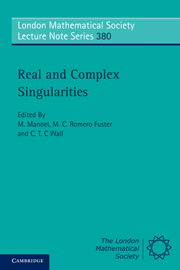Book contents
- Frontmatter
- Contents
- Preface
- 1 On a conjecture by A. Durfee
- 2 On normal embedding of complex algebraic surfaces
- 3 Local Euler obstruction, old and new, II
- 4 Branching of periodic orbits in reversible Hamiltonian systems
- 5 Topological invariance of the index of a binary differential equation
- 6 About the existence of Milnor fibrations
- 7 Counting hypersurfaces invariant by one-dimensional complex foliations
- 8 A note on topological contact equivalence
- 9 Bi-Lipschitz equivalence, integral closure and invariants
- 10 Solutions to PDEs and stratification conditions
- 11 Real integral closure and Milnor fibrations
- 12 Surfaces around closed principal curvature lines, an inverse problem
- 13 Euler characteristics and a typical values
- 14 Answer to a question of Zariski
- 15 Projections of timelike surfaces in the de Sitter space
- 16 Spacelike submanifolds of codimension at most two in de Sitter space
- 17 The geometry of Hopf and saddle-node bifurcations for waves of Hodgkin-Huxley type
- 18 Global classifications and graphs
- 19 Real analytic Milnor fibrations and a strong Łojasiewicz inequality
- 20 An estimate of the degree of ℒ-determinacy by the degree of A-determinacy for curve germs
- 21 Regularity of the transverse intersection of two regular stratifications
- 22 Pairs of foliations on surfaces
- 23 Bi-Lipschitz equisingularity
- 24 Gaffney's work on equisingularity
- 25 Singularities in algebraic data acquisition
13 - Euler characteristics and a typical values
Published online by Cambridge University Press: 07 September 2011
- Frontmatter
- Contents
- Preface
- 1 On a conjecture by A. Durfee
- 2 On normal embedding of complex algebraic surfaces
- 3 Local Euler obstruction, old and new, II
- 4 Branching of periodic orbits in reversible Hamiltonian systems
- 5 Topological invariance of the index of a binary differential equation
- 6 About the existence of Milnor fibrations
- 7 Counting hypersurfaces invariant by one-dimensional complex foliations
- 8 A note on topological contact equivalence
- 9 Bi-Lipschitz equivalence, integral closure and invariants
- 10 Solutions to PDEs and stratification conditions
- 11 Real integral closure and Milnor fibrations
- 12 Surfaces around closed principal curvature lines, an inverse problem
- 13 Euler characteristics and a typical values
- 14 Answer to a question of Zariski
- 15 Projections of timelike surfaces in the de Sitter space
- 16 Spacelike submanifolds of codimension at most two in de Sitter space
- 17 The geometry of Hopf and saddle-node bifurcations for waves of Hodgkin-Huxley type
- 18 Global classifications and graphs
- 19 Real analytic Milnor fibrations and a strong Łojasiewicz inequality
- 20 An estimate of the degree of ℒ-determinacy by the degree of A-determinacy for curve germs
- 21 Regularity of the transverse intersection of two regular stratifications
- 22 Pairs of foliations on surfaces
- 23 Bi-Lipschitz equisingularity
- 24 Gaffney's work on equisingularity
- 25 Singularities in algebraic data acquisition
Summary
Abstract
The theorem of Hà and Lê says that one can check using the Euler characteristic of the fibres whether a polynomial mapping ℂ2 → ℂ is locally trivial in the sense that it defines a C∞ fibre bundle. This theorem will be generalized to the case of a polynomial mapping g : Z → ℂ, where Z is a smooth closed algebraic subvariety of some ℂN, not necessarily of dimension 2. It is well-known that even in the case Z = ℂn, n ≥ 3, it is no longer enough to look at the Euler characteristic of the fibre of g alone without serious additional assumptions. In this paper we will use the Euler characteristic of other spaces for this purpose in order to avoid explicit reference to some compactification.
The method of proof is the following: first it is shown that there is no vanishing cycle at infinity (with respect to a suitable compactification) and then that one can construct vector fields which lead to a local trivialization.
Introduction. Let g : ℂn → ℂ be a polynomial map. It is well-known that even if g has no critical points it may happen that g does not define a fibre bundle which is locally (and therefore globally) C∞ trivial. This is due to the circumstance that g is not proper as soon as n > 1, so we cannot apply Ehresmann's theorem.
- Type
- Chapter
- Information
- Real and Complex Singularities , pp. 167 - 184Publisher: Cambridge University PressPrint publication year: 2010



